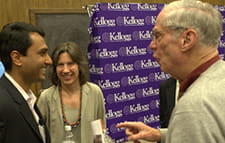The founder of Interfaith Youth Core poses the question, “Is religion of the 21st century going to be a bubble of isolation … or a bridge to cross?”
4/26/2010 - At age 19, Eboo Patel read an article that forever changed his life.
| |
 |
Related Video |
|
| |
| |
|
| Published in the
Atlantic Monthly, the article profiled Muhammad Yunus, an economics professor who developed the concept of microcredit in his home country of Bangladesh. Unlike traditional bank loans, microcredit loans were available to entrepreneurs in a low-income bracket. (Yunus later won the Noble Peace Prize for creating this loan category.)
Patel, who was then a student at the University of Illinois, read Yunus’ story with awe. He was surprised to learn that there was a term for people like him: social entrepreneur.
“I said, ‘Man, that’s what I really want to be,’” Patel recalled, addressing Kellogg students in the Owen L. Coon Forum on April 21. “I’d always been a guy who tried to analyze the world, seek problems, find solutions, implement the solutions and see if they existed elsewhere. The idea that someone could do it, and make it a calling or a vocation, sounded like a pretty good thing.”
In 1998, Patel too became a social entrepreneur when he launched
Interfaith Youth Core, a Chicago-based nonprofit that brings together young people of different religions for service-based activities and discussions around shared values. Today, IFYC is divided into three program areas — public advocacy, outreach education and training, and leadership — which together “create a movement of young people who bridge their religious differences.”
 |
| Eboo Patel, the founder of Interfaith Youth Core, chats with Clinical Professor Michelle Buck and Professor Wally Scott during his April 21 visit to the Kellogg School. |
| Photo © Carlos J. Ortiz |
Patel’s visit to the Kellogg School was among the highlights of this year’s MOSAIC Week (April 16-23), an annual celebration of global diversity at Kellogg. Sponsored by KSA Global Affairs, the Office of Diversity & Inclusion and the International Business and Markets Research Center, MOSAIC 2010 featured ethnic cuisine, international music, cultural activities and a series of lectures by Kellogg professors and business leaders.
In addition to Patel’s talk, “Turning Conflict Into Collaboration: Leadership In a World of Religious Crisis,” Alan Murray, CEO of Tetra Pak Inc., shared his experiences as a South African working for a Swedish conglomerate; Professor Katherine Phillips delivered the lecture, “What’s the Big Deal About Diversity?;” and Interim Dean Sunil Chopra offered the address, “Having a Global Mindset as a Kellogg Student.”
Michelle Buck, clinical professor of management and organizations and director of leadership initiatives, offered introductory remarks for Patel’s lecture. She pointed out that Patel can be a model for MBA students, despite the fact that his expertise is outside the corporate world.
“The truth of the matter is that the work that [Patel] is doing in the interfaith youth movement involves the same fundamental leadership competencies that are necessary to be effective for global business leaders in all industries and sectors throughout the world,” Buck said. “His work seeks to leverage the different traditions and perspectives of people around the world, taking what can be conflict or crisis and transforming it into opportunity, into possibility, into collaboration of shared values.”
Buck also noted that Patel’s efforts are well-aligned with Kellogg’s mission of “developing global leaders who make contributions of lasting significance for the world.”
“His success is impressive, but clearly the work that he and Interfaith Youth Core are doing is very significant,” she said. “It’s profoundly needed in this world today, and significant in its implications as we increasingly work with people of diverse backgrounds and we increasingly need to find the shared interests that unite us.”
In 2009, Patel was named one of America’s Best Leaders by
US News & World Report. He is a regular contributor to the
Washington Post,
CNN, and
NPR, and has spoken at the TED Conference, the Clinton Global Initiative, and the Nobel Peace Prize Forum. He serves on the White House Office of Faith-Based and Neighborhood Partnerships and on the board of the Chicago Council on Global Affairs. He holds a doctorate in the sociology of religion from Oxford University, where he studied on a Rhodes scholarship.
At the conclusion of his speech, Patel expressed his interest in creating a partnership between IFYC and the Kellogg School. The nonprofit needs to build a network for 10,000 religious leaders, create policy that translates among many policy sectors and solve other problems that are best addressed by those with a business background, he said.
“My hope is that this is the beginning of a conversation between Interfaith Youth Core and the Kellogg School of Management,” he said. “This school has launched a lot of social innovation, and we’d like Interfaith Youth Core to be a part of that. And we need the help of folks like you to be a part of that.”
It all comes down to a problem statement, Patel said. “Is religion of the 21st century going to be a bubble of isolation, a barrier of division, a bomb of destruction or a bridge to cross? Which is it going to be?”






